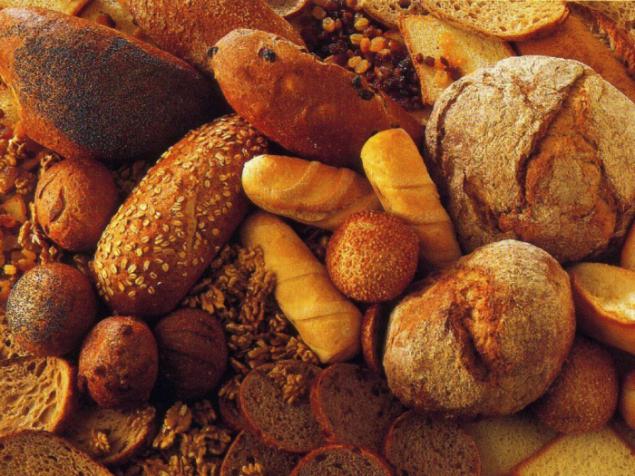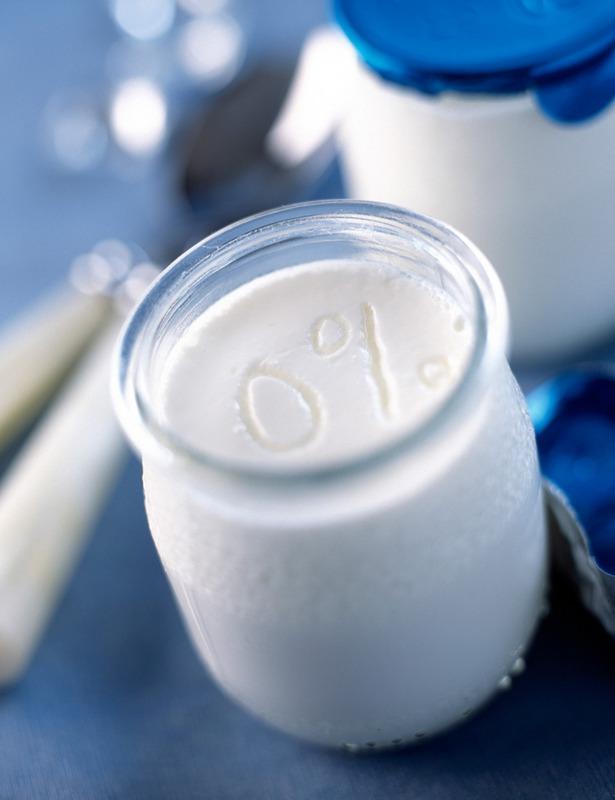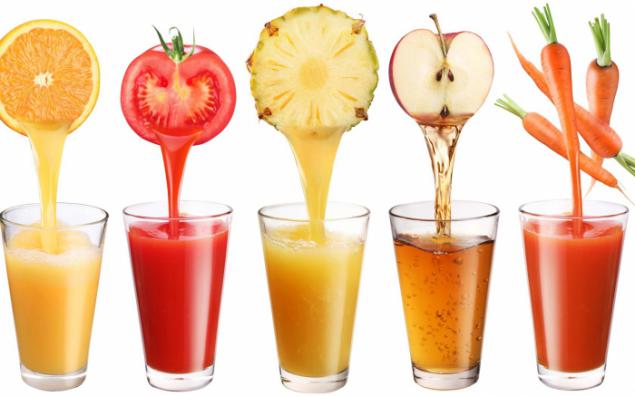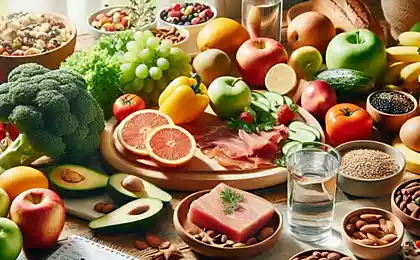919
Throwing in the diet
What mistakes we make most often, trying to start eating right
We often refuse from our usual products in favor of a more "healthy". But even so, at first glance, a very correct and healthy food - or rather, new eating habits can cause the body harm. So, what could be wrong?
1. Complete abandonment of bakery products.
Bread in our country eat a lot, for us it is a traditional snack almost any dish. But this source of fast carbohydrates leads to the inevitable set of extra pounds. Therefore, getting on the path of good nutrition, we first cross out exactly bread from your diet.
The paradox, but recognized the most useful for a healthy diet - Mediterranean - proclaimed a cult of bread and pasta. The thing is that flour for "their" bread and pasta made from durum wheat. The structure consists of a meal is not fast carbohydrates in our wheat and slow. They act on the metabolism in the best way. Contrary to popular belief, such a system is not traditional for all Mediterranean countries. For example, in Italy the use of this type of flour has been established by law, and today its use in recipes already inseparable from the Italians.
Yield: carefully read the package. "Calculate" products from durum wheat can be visually: pasta - much darker, and there are grains of whole wheat bread and bran, which fall into the dough in the manufacture.

2. Buy only low-fat dairy products.
Today it is no secret that the milk fat in the diet should be reduced: The World Health Organization calls it one of the key instigators of heart disease and blood vessels in Europe, as well as major activator of diabetes and the development of cancer. The reason for this is the high content of saturated fatty acids and growth hormones.
But the complete exclusion of fat from dairy products - not an option, since most of the vitamins contained in milk, fat-soluble. In addition, low-fat foods are not as tasty: familiar to us the taste of milk provides just fat. In order not to lose it, manufacturers add sugar to fat-free products, as a result, we consume it several times more than the permitted per day.
Yield: buy low-fat dairy products (up to 2, 5 percent fat). And, if the testimony of health you can not do milk fat - functional, where it specifically replaced by vegetable fatty acids.

3. Excessive use of products for diabetics
Products with this label are often chosen not only to people with diabetes - they are very popular among consumers who just want to buy a lightweight version of the familiar food. Indeed, the sugar in foods is replaced by fructose, which at first sight "light" versions of sugar.
But the caloric content, they often do not concede, and even surpass its predecessors. In addition, there is another important point. In sugary foods for diabetics in abundance may contain trans fats. These components supply, according to the World Health Organization, and block insulin sensitivity.
Exit: to purchase products from the dietary department did not turn health problems, carefully look at the packaging and look for foods labeled "no trans fats" or "no trans fats" - the same thing.

4. Loving packaged juices.
The most useful alternative to fizzy drinks we believe juices. In fact, this belief - the result of competent work in marketing, which was conducted over the years. Contrary to popular opinion, the main problem gazirovok - no preservatives and dyes, and high sugar content. Its content in packaged juices almost similar.
Even if 100 percent juice (e.g., apple or orange), the content of natural sugar (sucrose or fructose) it is also high. In addition, packaged juices often lack useful fiber that makes up the lion's share of the benefits of natural fruits. As a result, the problem does not disappear. Fresh juices, certainly more useful, however, and should not be overused, especially on an empty stomach.
Yield: WHO recommends to drink a day not more than 200 ml of juice. That is only a glass a day will not cause harm to the figure. But nutritionists recommend to dilute the juice half water, so we will reduce the sugar content. In addition, juices, especially sweet, better to drink in the morning - then all will go to the sugar business, that is used up on the mental or physical activity is not being held where no tedious

5. Complete rejection of salt and sugar
Today, unfortunately, is almost an impossible idea. Modern products often have hidden salt or sugar, the content of which we can not even suspect. It is not always imposed on the packaging, this spring our Ministry of Health only spoke about the need to introduce such measures in respect of salt.
Output: the rejection of salt and sugar will be effective only if you know a list of popular products, where these components are present in large numbers in the "hidden" form.
Salt: bread, cheese, fast food, instant soups, chips, sausages, prepared foods, vegetable juices, canned vegetables.
Sugar: Quick-cooking cereals, breakfast cereals, fruit juices, pastries, many caffeinated drinks, fruits and dried fruits.
But do not forget that the salt is necessary for us to complete the work of the body, and sugar gives energy. Maybe you should not completely give them up? And just to reduce the number.
IMPORTANT!
Ask your doctor
These simple facts can be taken to attention, but it should be understood that in matters of food can not be one truth for all. Before you decide to waive any product, talk about it with your doctor, do not take this as a formality. Do not rush to extremes - if you follow this principle, the transition to a healthy lifestyle will be painless.

©
We often refuse from our usual products in favor of a more "healthy". But even so, at first glance, a very correct and healthy food - or rather, new eating habits can cause the body harm. So, what could be wrong?
1. Complete abandonment of bakery products.
Bread in our country eat a lot, for us it is a traditional snack almost any dish. But this source of fast carbohydrates leads to the inevitable set of extra pounds. Therefore, getting on the path of good nutrition, we first cross out exactly bread from your diet.
The paradox, but recognized the most useful for a healthy diet - Mediterranean - proclaimed a cult of bread and pasta. The thing is that flour for "their" bread and pasta made from durum wheat. The structure consists of a meal is not fast carbohydrates in our wheat and slow. They act on the metabolism in the best way. Contrary to popular belief, such a system is not traditional for all Mediterranean countries. For example, in Italy the use of this type of flour has been established by law, and today its use in recipes already inseparable from the Italians.
Yield: carefully read the package. "Calculate" products from durum wheat can be visually: pasta - much darker, and there are grains of whole wheat bread and bran, which fall into the dough in the manufacture.

2. Buy only low-fat dairy products.
Today it is no secret that the milk fat in the diet should be reduced: The World Health Organization calls it one of the key instigators of heart disease and blood vessels in Europe, as well as major activator of diabetes and the development of cancer. The reason for this is the high content of saturated fatty acids and growth hormones.
But the complete exclusion of fat from dairy products - not an option, since most of the vitamins contained in milk, fat-soluble. In addition, low-fat foods are not as tasty: familiar to us the taste of milk provides just fat. In order not to lose it, manufacturers add sugar to fat-free products, as a result, we consume it several times more than the permitted per day.
Yield: buy low-fat dairy products (up to 2, 5 percent fat). And, if the testimony of health you can not do milk fat - functional, where it specifically replaced by vegetable fatty acids.

3. Excessive use of products for diabetics
Products with this label are often chosen not only to people with diabetes - they are very popular among consumers who just want to buy a lightweight version of the familiar food. Indeed, the sugar in foods is replaced by fructose, which at first sight "light" versions of sugar.
But the caloric content, they often do not concede, and even surpass its predecessors. In addition, there is another important point. In sugary foods for diabetics in abundance may contain trans fats. These components supply, according to the World Health Organization, and block insulin sensitivity.
Exit: to purchase products from the dietary department did not turn health problems, carefully look at the packaging and look for foods labeled "no trans fats" or "no trans fats" - the same thing.

4. Loving packaged juices.
The most useful alternative to fizzy drinks we believe juices. In fact, this belief - the result of competent work in marketing, which was conducted over the years. Contrary to popular opinion, the main problem gazirovok - no preservatives and dyes, and high sugar content. Its content in packaged juices almost similar.
Even if 100 percent juice (e.g., apple or orange), the content of natural sugar (sucrose or fructose) it is also high. In addition, packaged juices often lack useful fiber that makes up the lion's share of the benefits of natural fruits. As a result, the problem does not disappear. Fresh juices, certainly more useful, however, and should not be overused, especially on an empty stomach.
Yield: WHO recommends to drink a day not more than 200 ml of juice. That is only a glass a day will not cause harm to the figure. But nutritionists recommend to dilute the juice half water, so we will reduce the sugar content. In addition, juices, especially sweet, better to drink in the morning - then all will go to the sugar business, that is used up on the mental or physical activity is not being held where no tedious

5. Complete rejection of salt and sugar
Today, unfortunately, is almost an impossible idea. Modern products often have hidden salt or sugar, the content of which we can not even suspect. It is not always imposed on the packaging, this spring our Ministry of Health only spoke about the need to introduce such measures in respect of salt.
Output: the rejection of salt and sugar will be effective only if you know a list of popular products, where these components are present in large numbers in the "hidden" form.
Salt: bread, cheese, fast food, instant soups, chips, sausages, prepared foods, vegetable juices, canned vegetables.
Sugar: Quick-cooking cereals, breakfast cereals, fruit juices, pastries, many caffeinated drinks, fruits and dried fruits.
But do not forget that the salt is necessary for us to complete the work of the body, and sugar gives energy. Maybe you should not completely give them up? And just to reduce the number.
IMPORTANT!
Ask your doctor
These simple facts can be taken to attention, but it should be understood that in matters of food can not be one truth for all. Before you decide to waive any product, talk about it with your doctor, do not take this as a formality. Do not rush to extremes - if you follow this principle, the transition to a healthy lifestyle will be painless.

©
























